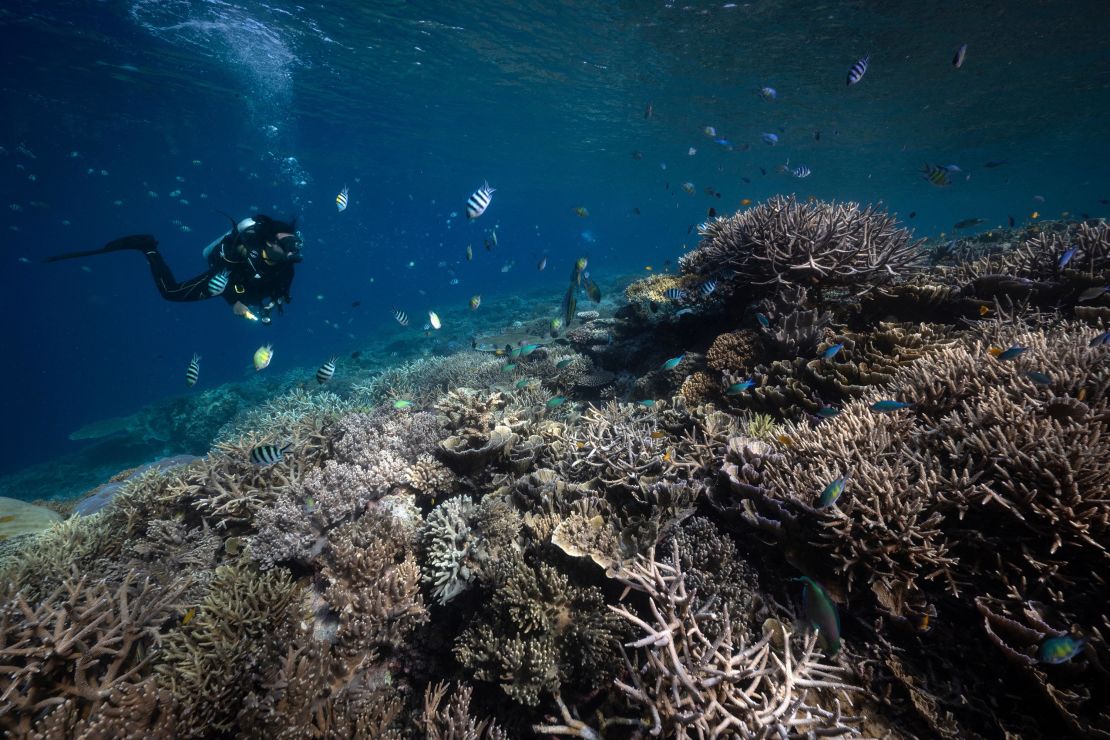
Global coral reefs are undergoing mass bleaching due to record ocean heat driven by the climate crisis, warned two scientific bodies on Monday. Experts fear this could mark the worst bleaching event in history, according to CNN.
In the past year, over 54% of global coral reef areas, spanning 53 countries and territories, including extensive regions of the Atlantic, Pacific, and Indian Oceans, have undergone bleaching, according to a joint statement from NOAA and ICRI.
Derek Manzello from NOAA’s Coral Reef Watch program anticipates the current event to exceed the previous peak of 56.1% soon. He noted that the percentage of reef areas facing bleaching-level heat stress is rising by approximately 1% per week.
During marine heatwaves, stressed corals expel the algae residing in their tissue, their source of color and energy. If ocean temperatures persist at high levels, bleaching can escalate to widespread coral mortality, posing a risk to species and disrupting dependent food chains.
This marks the world’s fourth global bleaching event, and the second in the past decade. The previous periods were in 1998, 2010, and between 2014-2017 respectively.
In the past year, mass bleaching has been confirmed in various regions, such as Florida, the wider Caribbean, Mexico, Brazil, Australia, the South Pacific, the Red Sea, the Persian Gulf, Indonesia, and the Indian Ocean, including the east coast of Africa and the Seychelles.
Professor Ove Hoegh-Guldberg, a coral reef climate scientist at the University of Queensland in Australia, forecast this mass bleaching event months in advance.
“We knew sea temperatures were increasing rapidly, but not at this speed,” Hoegh-Guldberg told CNN on Monday. “The worrying issue is that we don’t know how long this massive temperature change is likely to last.”
The past 12 months marked the planet’s warmest on record, with ocean temperatures soaring unprecedentedly. Global sea surface temperatures peaked in both February and March, setting new records, as reported by the European Commission’s Copernicus Climate Change Service.
In response to escalating underwater warming, Coral Reef Watch scientists at NOAA introduced three additional alert levels to the coral bleaching alert maps in February.
Will La Niña bring relief ?
El Niño, a natural climate pattern which originates in the Pacific Ocean along the equator and tends to push up global temperatures, has helped drive the unprecedented ocean heat.
NOAA anticipates the arrival of La Niña, El Niño’s cooler counterpart, between June and August this year, offering “a glimmer of hope” for coral reefs, according to NOAA’s Manzello. However, he cautioned that bleaching events have occurred during La Niña in recent years.
“I am becoming increasingly concerned about the 2024 summer for the wider Caribbean and Florida,” Manzello said. “When we roll into summer and the bleaching season for Florida and the Caribbean, it won’t take much additional seasonal warming to push temperatures past the bleaching threshold.”
In mid-February, CNN observed widespread coral bleaching across Australia’s Great Barrier Reef, the world’s largest coral reef system, affecting five reefs in both northern and southern regions. The Australian Institute of Marine Science (AIMS) and the Great Barrier Reef Marine Park Authority confirmed a mass bleaching event there last month through aerial and underwater surveys.
“The increasing frequency and extremity of marine heatwaves driven by climate change, is testing the tolerance levels of coral reefs,” said Selina Stead, the CEO of AIMS. “Climate change is the biggest threat to coral reefs worldwide and this global confirmation illustrates just how extensive its impact has been across the last 12 months.”
“That is why it is critical for the world to exert effort to reduce carbon emissions,” Stead added. “It is also important to ensure coral reefs are well managed at local and regional levels.”
The UN Environment Programme cautions that without aggressive emission reductions, the planet is on track for nearly 3 degrees Celsius of warming above pre-industrial levels this century.
Scientists predict that even at 2 degrees of warming — which the world could reach around 2050 — approximately 99% of corals on Earth would die. Coral reefs serve as vital habitats for marine life and play a critical role for coastal communities. They serve as essential defense systems against storm-related flooding and sea level rise, while also supporting livelihoods and serving as a key food source for approximately one billion people worldwide.
David Ritter, CEO of Greenpeace Australia, said reefs were facing “existential danger” and that blame lies “squarely with the main culprits fueling global warming: fossil fuel companies, and the governments who prop up this industry.”
“We are running out of runway to avoid irreversible climate disaster,” he added, “and must act quickly to ensure an immediate end to new fossil fuels.”
Related Topics :
KAUST Undertakes Study on Coral Reefs, Algae Control
Saudi Arabia works to protect coral reefs alongside its coasts
Scientists discover a huge coral colony dating back 600 years on a Saudi island







